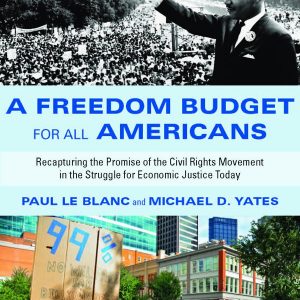A Freedom Budget for All Americans
FRIDAY, 11 APRIL 2014 10:34
WRITTEN BY ADAM TOMES
This imaginative telling of a lost gem of American history offers a practical challenge to the neoliberal agenda, writes Adam Tomes
Paul Le Blanc and Michael D. Yates, A Freedom Budget for All Americans: Recapturing the Promise of the Civil Rights Movement in the Struggle for Economic Justice Today (Monthly Review Press 2013), 303pp.
This history of the Freedom Budget offers a challenge to the mainstream retelling of the story of the Civil Rights movement as well as the neoliberal economic agenda. It does this by being an inspiring history of the movement itself and its key characters in their aim to link ‘racial justice for African Americans with the goal of economic justice for all Americans’ (p.9). By understanding the movement without the diluting and sanitizing effects of mainstream historians, it offers an insight into victories, defeats and individuals, altogether acting as a siren song to call activists to action. At the same time, the authors offer a concrete vision of what a ‘different, more egalitarian and humane society’ would look like (p.241). As such, this is a book not just for the historian but for the activist as well. It would make excellent reading for a study or book group, especially the final chapter that suggests a framework for a new Freedom Budget for the neoliberal world.
The Freedom Budget was proposed in 1966 by civil rights leaders including Martin Luther King Jr, Bayard Rustin and A. Philip Randolph. The Budget ‘projected the elimination of poverty within a ten year period, the creation of full employment and decent housing, healthcare and education for all people in our society as a right’ (p.9). The authors carefully place these demands within the context of the civil rights movement and the Johnson presidency. The Budget, in this context, was ‘explicitly not a program for socialism’ but was ‘developed and advanced most effectively by socialists’ (p.15).
By exploring the history of the civil rights movement through the prism of the budget, the authors are able to show that the leading figures in the movement had a ‘socialist orientation’, and also to demonstrate the key role of ‘genuine socialists’, which certainly contradicts ‘the popular accounts of the movement’ (pp.14-15). It is worth comparing here the mainstream history of Martin Luther King with the fact he was assassinated supporting a sanitation workers’ strike, and his words on the war on Vietnam: ‘our only hope today lies in our ability to recapture the revolutionary spirit and go out into a sometimes hostile world declaring eternal hostility to poverty, racism and militarism’ (p.150)…

Comments are closed.